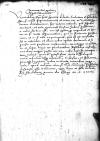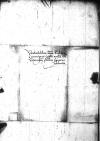Letter #1852
Ioannes DANTISCUS to Ermland (Warmia) ChapterHeilsberg (Lidzbark), 1538-05-01
English register:
Dantiscus demands that the Chapter present him as soon as possible with a clear interpretation of the article that he considers to contradict the financial claims (pensio aut pensionis reservatio) of the Cantor [Johannes Tymmermann]. Dantiscus encloses a copy of the said article, underlining that it was authored by the Chapter.
As for the other matters, he hopes to discuss them in person, if he manages to come to Frauenburg (Frombork) before departing on a diplomatic mission [to Ferdinand I of Habsburg in Wrocław (Breslau)].
Manuscript sources:
Prints:
| ||||||
Text & apparatus & commentary Plain text Text & commentary Text & apparatus Excerpts concerning Dantiscus' travels
Venerabilibus Dominis,
Venerabiles Domini, fratres sincere dilecti.
Salutem et felicitatem.
Quod Fraternitates Vestras deputaverimus, ut inter nos et venerabilem dominum
Reliqua omnia ad nostrum usque adventum, si forsan, ut speramus, priusquam legationi nobis iniunctae intendere cogamur,[2] apud ecclesiam[3] cum Fraternitatibus Vestris convenire possimus, suspensa esse volumus.
Quae bene et feliciter valeant.


 BCz 1596, p. 482
BCz 1596, p. 482